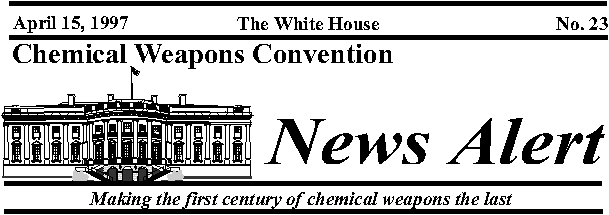The Chemical Weapons Convention received the strong backing of the
chemical industry at Senate hearings today.
Testifying in support of the CWC, Fred Webber, President and CEO of the
Chemical Manufacturers Association, said, �The industry I represent is
America�s largest export industry, with over 1 million American
jobs. ... We know how this treaty affects our commercial interests. ... We began with
many of the same concerns about the treaty that have been voiced here. We worked hard
to protect U.S. industrial interests, especially proprietary information. We helped develop
the protocols guiding the treaty�s inspection and record-keeping requirements, and we put
those protocols to live-fire tests over and over again. ... In summary, we believe the treaty
is not a threat to U.S. businesses. This treaty passes muster. The chemical industry
supports it. The CWC is the right thing to do.�
Testifying against the Convention was Steve Forbes, honorary chairman of the group
�Americans for Hope, Growth and Opportunity.� Forbes� opposition ignores the overwhelming
support for the CWC among the chemical industry and business, and from the American people
as well. In a poll conducted by the Wirthlin Group in February that gave respondents a
succinct, balanced summary of arguments by two hypothetical Senate candidates -- one for,
one against the treaty -- 75 percent of the respondents said they would support the
candidate who supported ratification.
Business Supports Convention
Overwhelming support from the chemical industry and business includes: the Chemical
Manufacturers Association (CMA), which represents 193 chemical manufacturing companies
(accounting for more than 90 percent of the nation�s productive capacity for basic
chemicals); the Synthetic Organic Chemical Manufacturers Association, with over 260 member
companies (typically small businesses); the Pharmaceutical Research & Manufacturers of
America (with over 100 member companies); the Biotechnology Industry |
Organization (with
over 650 member companies and affiliated organizations); Business Executives for National Security; Council for Chemical Research; American Crop
Protection Association; American Institute of Chemical Engineers; and the American Chemical
Society.
Small business, through the National Federation of Independent Business (NFIB), called
treaty opponent�s claims that it opposed the treaty �100% incorrect� (Wall Street Journal,
2/14/97). An NFIB official predicted its members �are not going to be impacted.�
Impact on Industry
The chemical industry, which strongly supports the CWC, helped write the rules covering
inspections and confidential business information -- ensuring that any burdens on business
were reasonable and protecting trade secrets were its top priorities during the treaty
negotiations conducted by the Reagan and Bush administrations. The CMA �test drove� the
treaty during seven full-fledged trial inspections at chemical facilities to make sure
the protections against unreasonable searches and seizures and industrial espionage are
strong. They are. Besides providing for warrants when a company does not consent to a
search, the treaty protects sensitive equipment, information or areas not related to
chemical weapons during a challenge inspection through managed access techniques.
Of the fewer than 2,000 American companies the Administration expects to be covered
by the treaty, more than 90 percent will be required to do little more than fill out a
two-page form once a year. Only about 140 companies are likely to be subject to routine
inspections. Few challenge inspections are expected at U.S. commercial facilities.
What the critics fail to point out is the cost to American business if we fail to
ratify. The CMA has conservatively estimated between $500 - $600 million a year in
two-way trade by American chemical companies, and many jobs, will be at risk from mandatory
trade restrictions designed to pressure rogue states to join.
|


